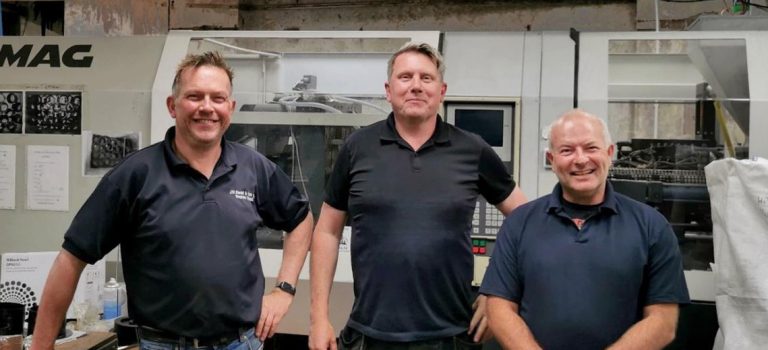Rollits welcomes top regional businesses to chip in for charities
Takeover of York City Football Club completes
Housebuilder sells portfolio of homes for £50m
Yorkshire business confidence jumps as firms focus on growth
South Yorkshire plan aims to create at least 300 apprenticeships
- Help for businesses (SMEs in particular) to access technical talent across the region to tackle skills shortages.
- Information, advice and guidance services to apprentices, parents and employers.
- Progression pathways and opportunities into and out of high-quality Level 2 and 3 apprenticeships
- Help supporting development of a public sector approach to apprenticeships, including flexi-job apprenticeships.
Delivery solutions provider swoops for 15 Tuffnells sites
Insurance group makes tenth acquisition of 2023
Sheffield Hallam reveals Health Innovation Campus vision
- An Advanced Health and Care Skills Centre: Meeting the challenge of creating a modern health and care workforce with cutting edge training facilities and expertise
- A Nursery of the Future: A national and global beacon for advanced ideas, technologies and best practice in early childhood education, family support and health, including a community-based research and teaching nursery
- Sheffield Hallam Health Acceleration Programme (SHAPe): A holistic business accelerator proposition which offers pre-revenue, start-up and SME accelerator activity and expertise to participating companies
Simple customs declarations top trade priorities for Government as majority of small firms outsource paperwork to intermediaries
- Building a small business-friendly Single Trade Window, an online portal delivering a ‘once and done’ approach to Government data collection.
- Targeting business support towards those with high export potential, and those in sectors that say they find a lack of guidance particularly difficult.
- Monitor potential anti-competitive behaviour resulting from supply chain disruption via the Competition and Markets Authority Five Eyes working group.
- Adopting a ‘think small first’ approach to customs policy development, including robust piloting and staggered implementation timelines. Government should also commit to raising the de minimis customs duty threshold to £1,000.
Government climate targets must be backed by specific policy, says Drax CEO
Business Growth Programme creates 35 new West Yorkshire jobs
Bringing it home: Regenerated Cole Brothers building stays in the family
Cultural Heart development in Huddersfield to move into delivery phase
Sheffield Hallam University city campus development tops out
Stage set for Halifax theatre improvements
Construction firm zones in on latest project win
A construction firm has been awarded a £10m contract to build the start-of-the-art Horizon Youth Zone complex in Grimsby, North East Lincolnshire.
Yorkshire and Lincolnshire construction firm, Hobson & Porter, will start the preliminary works at Garth Lane in Grimsby in the next few months, preparing the ground and heritage-listed buildings ahead of the major build, which will begin this summer. The disused site was formerly home to West Haven Maltings and Migar House buildings. The maltings and grain store were built in the 19th century and are listed.
Horizon Youth Zone is being delivered by national charity OnSide, in partnership with North East Lincolnshire Council which is contributing towards the Youth Zone as part of the Greater Grimsby Town Deal. Other key supporters include Historic England, the National Lottery Heritage Fund, Ørsted, St. James’s Place Charitable Foundation, The Youth Investment Fund and private donors.Business development director from Hobson & Porter, Joe Booth, said: “We can’t wait to get started on-site on this hugely beneficial project that is going to make such a difference to so many people in and around Grimsby. OnSide have a phenomenal track record elsewhere in the UK of operating these facilities and the positive impact they have on communities is unparalleled.
“This is a very intricate, exciting project which plays to several of our strengths; not least listed, heritage building restoration, educational buildings and the creation of sports and leisure facilities. Our track record in Grimsby has been incredibly strong in recent years and we are delighted to be playing our part in turning the tide for investment in the town.”
Expected to open in early 2025, the state-of-the-art youth centre will provide thousands of young people with opportunities to engage in activities and access support from skilled youth workers, helping them to develop their skills and reach their full potential. It will be open to young people aged between eight and 19 (up to 25 for those with additional needs), seven days a week, for just 50p a visit. Members will have access to an indoor climbing wall, four court sports hall, training kitchen, music room with a recording studio, fully equipped gym, dance and drama studio, 3G kick pitch, arts and crafts room, enterprise and employability suite. Horizon Youth Zone is an independent charity with a private sector led board, and once opened, it will be part of the OnSide Network of 14 Youth Zones nationwide, supporting over 50,000 young people annually. After completion, it’s thought the centre could benefit up to 4,000 young people across the borough. Jason Stockwood, chair of the Horizon Youth Zone, said: “As chair of Horizon and someone who grew up in Grimsby, I am so proud we have reached this incredible milestone. It won’t be long before Grimsby’s young people can see the heritage buildings transformed into a space which they truly deserve. The project will also help support the wider regeneration of Grimsby Town Centre.”Leeds business park put up for sale
A well-known Leeds business park that is currently home to 18 companies and public sector organisations, that employ hundreds of people, has been put up for sale.
WIRA Business Park offers 111,197 sq ft of accommodation, in a wide range of suite sizes, spanning office spaces and light industrial units. The 4.38 acre site, which sits between Lawnswood roundabout and Horsforth’s Woodside roundabout, also has parking for 259 cars and is being marketed by Leeds property consultancy, GV&Co’s investment division, on behalf of Canmoor.
The business park was originally constructed in the early 1980’s as the headquarters of the Wool Industries Research Association (WIRA). Its two main buildings have been re-purposed in recent years to appeal to a variety of businesses.
Garry Howes, director of investment at GV&Co, said: “WIRA Business Park is well-positioned on the Leeds outer ring road. It currently produces a total passing rent of £839,720 and there are immediate asset management and ESG opportunities to grow this significantly, as well as some vacant units which are in an immediately lettable condition.
“The site also offers an attractive weighted average unexpired lease term (WAULT) of more than five years, which further enhances its credentials as a solid investment opportunity, and we’re envisaging significant interest from both local and national investors.”
GV&Co is instructed to seek offers in excess of £7.87million, reflecting a net initial yield of 10%.






















